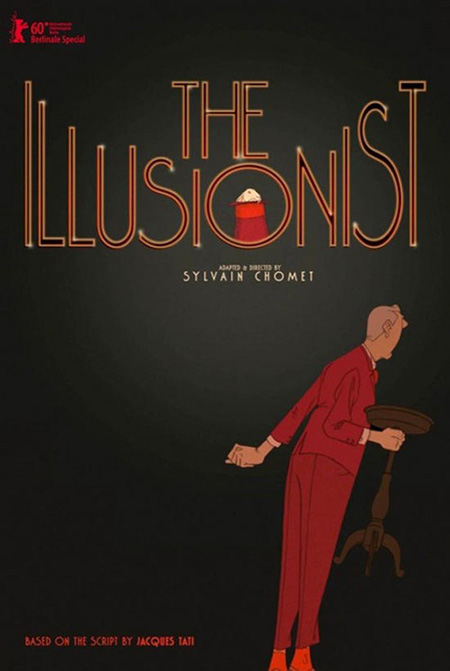Having seen and been considerably impressed by Sylvain Chomet’s previous film The Triplets of Belleville, I had great expectations from his latest offering. Its distinctive and lovingly rendered two-dimensional animation was the primary reason it caught my eye, and I’m glad to say that The Illusionist has got as much heart, warmth, and charm as it has some beautifully crafted visuals.
An illusion in itself as much as it is about a maker of illusions, Sylvain Chomet’s animated take on the life of a middle-aged Vaudevillian magician overflows with rainy-day beauty and mystery. The stage entertainer, appropriately named ‘Tatischeff’ (after the famous writer, director, actor, and mimer Jacques Tati, who was the original writer of the story ), is a stiff-limbed magician, at first, working for disinterested crowds in a Parisian theater. With his back held straight and fine-fingered hands whisking through age-old routines of disappearing flowers and glasses that seemingly defy the laws of gravity—when they’re not trying to wrangle a particularly unruly rabbit—the illusionist witnesses the end of an era of artistry.

Sylvain Chomet’s The Illusionist.
World-weary and sick of being second-billed, Tatischeff nevertheless continues to trudge through Britain and ply his trade. He travels to a grey and wet London to see if he can revitalise his career there, but he discovers that his act is even more irrelevant in a city swooning over the Beatles-like sensation of Billy Boy and the Britoons.
The film starts to lament for a lost era of entertainment, but just then, Tatischeff finds an appreciative audience when he travels to Scotland with a young girl, Alice, so enamoured by him that she takes his tricks at face value and him, to be possibly godlike. She actually believes that the stage illusions are real, and provides Tatischeff with unsolicited companionship, journeying with him from town to town. Eventually, the two characters settle in Edinburgh and Tatischeff scrapes by in yet another dingy theater, while in the boarding house, where they decide to live, the last vestiges of Vaudeville—a ventriloquist on his last legs and a suicidal clown—run out their endgame.
These characters are relegated to incidentals and never overtake the material. Instead, the main focus is on the understated, adult-oriented drama of the unlikely platonic friendship between the lonely Alice and the equally isolated Tatischeff, who senses that the world is on the verge of forgetting about him. The most interesting aspect of this relationship has Tatischeff building Alice’s sense of self-worth by purchasing more grown-up apparel for her—a formal coat, a long dress, high-heeled shoes. He’s essentially preparing her for womanhood, as a father might.
One of the most delightful qualities of The Illusionist is the tone, which is just about perfect. In pulling us into animated versions of the sleepy British hamlets of the post-World War II years, Chomet weaves and perpetuates a quiet lyricism. Everything onscreen is gentle, mellow, and dreamy, and that feels exactly right for the setting. The watercolor tones and slightly skewed perspectives can’t hide the nearly architectural eye for each building and street and tree. It’s safe to say the film is gorgeous to look at, with every shot benefitting from the director’s eye for detail and atmosphere.
This film takes on the purest and most difficult style of filmmaking; one that does not rely on dialogue or exposition to tell the story, but does so solely through moving images. It is a splendid example of how a story can be told almost entirely in visual terms, barring a few brief and unsubtitled utterances in English and French, and it also manages to keep your attention for a full 90 minutes. The predominantly visual experience has a very relaxing effect, which is enhanced by an almost seamless narrative.
Ultimately, there will be some who are going to be disappointed with the result, because some always are, but I suspect most will be pleased. Mostly because of the film’s unique, adoringly rendered animation; a nearly mute screenplay with an emphasis on visual storytelling; a rich, atmospheric world for its characters to inhabit, and a leisurely pace, audiences will find few reasons to complain. All you have to do is allow the quiet temperament of The Illusionist to captivate you and prepare yourself to view it like you would a magic trick.








